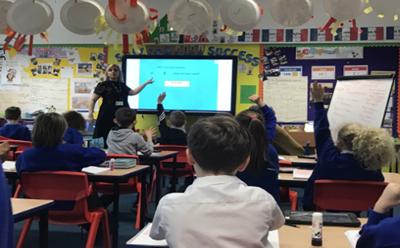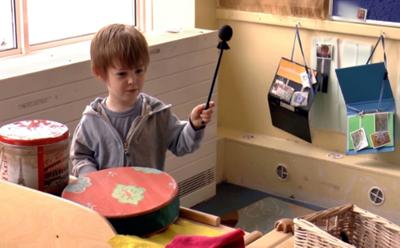Context
Marginalised groups or individuals, such as adults with learning disabilities, children on the autism spectrum, and ‘hard to reach’ children in primary schools, have typically been viewed as subjects of, rather than contributors to, research such that their views are often overlooked and underrepresented.
Research by CRI instead places these people and their perspectives at the centre of the research, working in collaborative ways with them to co-construct knowledge through shared research agendas.
Inclusive inquiry
In 2017-2020 Professor Kiki Messiou led pioneering collaborative work of the development of inclusive inquiry – an approach involving children taking the role of researchers, collecting their classmates’ views and designing lessons collaboratively with their teachers – which moves the idea of students’ voices to a different level.
The project influenced the practices of thirty diverse state schools – approximately 5100 students and 300 teachers – in five European countries.
Through the approach, teachers moved away from deficit thinking about students and focused on contextual factors to respond to diversity through valuing students’ views and having constructive dialogues with them. Students were also more engaged in lessons and reported increased confidence in participating.
The work is referenced in UNESCO policy documents, such as A Guide for ensuring inclusion and equity in education, which has been distributed to most countries and focuses on ways for realising UN Sustainable Development Goal 4 – inclusive and equitable quality education.
Digital Stories for autistic children and young people
Professor Sarah Parsons’ research forms collaborative partnerships between researchers and schools in autism education to co-construct the evidence base. In an ESRC-funded project in 2015, she developed creative digital storytelling methodologies in collaboration with practitioners that prioritised the views of autistic children and young people.
The resultant ‘Digital Stories’ are short films or narrated sequences of slides and images that convey experiences and practices with or around innovative technologies in the classroom. The co-creation of Digital Stories with teachers enabled them to find their voice in critiquing the usability, usefulness, efficacy and flexibility of the technologies for teaching and learning.
Subsequent research funded by The Froebel Trust focused on the co-construction of Digital Stories with young autistic children, parents and nursery staff, as the children prepared for transition to primary school. Parents reported greater understanding of their children and Educational Psychologists changed their assessment practices to include a more holistic representation of the child.
In light of COVID-19 and the closure of many educational settings, Digital Stories have become even more important. A set of web resources have been produced that help local and national educational providers to create their own Digital Stories. These resources have been distributed locally to over 1,500 early years settings in Hampshire, and nationally to educational psychology teams via EPNET – an online open and public forum for the exchange of ideas and information within educational psychology.
Autism Community Research Network @ Southampton (ACoRNS)
In 2016, Parsons developed the Autism Community Research Network @ Southampton (ACoRNS) in collaboration with the School of Psychology and with funding from the University of Southampton’s Public Engagement with Research unit.
ACoRNS works on the principal identified through Parsons’ research that building collaborative partnerships between researchers and school practitioners is central to achieving improved understanding of, and outcomes for, pupils on the autism spectrum.
ACoRNS has influenced the practices of teachers in special and mainstream schools, and early years settings in Southampton and Hampshire. Its impact is referenced in two Ofsted reports for outstanding schools.
The ACoRNS partnership model, and ACoRNS co-constructed research, has also been cited in the Autism Education Trust’s (AET) 2019 Full Report and Case Studies of their Good Autism Practice Guidance. Additionally, a new ACoRN@Sussex has been established with ESRC Impact Acceleration Funding.
Southampton Platform for Inclusive Research and Ideas Together (SPIRIT)
Professor Melanie Nind’s research focuses on facilitating the involvement of adults with learning disabilities in research dialogues and projects, with benefits for both the participants and the research. The theme of her 2011-2012 ESRC-funded study, Quality and capacity in inclusive research, was how to do research in ways that include people with learning disabilities without compromising quality.
Nind shared her research with community groups People First Dorset and Choices Advocacy in Southampton. Discussion of the impacts of research and ongoing research needs identified by adults with learning disabilities led to the formation of Southampton Platform for Inclusive Research and Ideas Together (SPIRIT), supported by the University’s ESRC Impact Acceleration Account.
Members of SPIRIT with learning disabilities worked together on ways to be ‘user-led’. They shaped the successful bid for Nind’s 2018-2020 ESRC Self-build social care project on life and learning in the new social policy landscape following the decline of day centres and rise of personalisation. Members sat on the project’s advisory group and worked on accelerating impact of that study by developing materials that learning disability groups can use in collaborating on self-building meaningful lives.
All this, they said ‘enabled us to build bridges into each other’s parallel worlds and to find our shared ground’, with a ‘domino effect’ across their work leading to ‘the best outcomes’.


